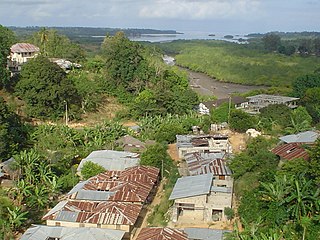
Zanzibar is an autonomous region of Tanzania. It is composed of the Zanzibar Archipelago in the Indian Ocean, 25–50 kilometres (16–31 mi) off the coast of the mainland, and consists of many small islands and two large ones: Unguja and Pemba Island. The capital is Zanzibar City, located on the island of Unguja. Its historic centre is Stone Town, a World Heritage Site.

Pemba Island is a Tanzanian island forming part of the Zanzibar Archipelago, lying within the Swahili Coast in the Indian Ocean.

Cabo Delgado is the northernmost province of Mozambique. It has an area of 82,625 km² and a population of 2,320,261 (2017). As well as bordering the neighboring country of Tanzania, it borders the provinces of Nampula and Niassa. The region is an ethnic stronghold of the Makonde tribe, with the Makua and Mwani as leading ethnic minorities.

Pemba is a port city in Mozambique. It is the capital of the province of Cabo Delgado and lies on a peninsula in Pemba Bay.

Pemba South Region(Swahili: Kusini Pemba) is one of the 31 regions of Tanzania. Located on Pemba Island, the region's capital is Mkoani.

Pemba North Region(Swahili: Kaskazini Pemba) is one of the 31 regions of Tanzania. Located on Pemba Island, the region's capital is Wete. The region includes islands adjacent to the northern part of Pemba, such as Njao Island and Fundu Island.

Tinhosa Grande is an uninhabited islet in São Tomé and Príncipe, located 23 km (14 mi) southwest of the island of Príncipe and 124 km (77 mi) northeast of the island of São Tomé. Together with the smaller islet Tinhosa Pequena, 4 kilometers to its north, it forms the Pedras Tinhosas group. It is 55 metres high, and its area is 20 hectares.

The Zanzibar Archipelago consists of several islands lying off the coast of East Africa south of the Somali sea. The archipelago is also known as the Spice Islands. There are four main islands, three primary islands with human populations, a fourth coral island that serves as an essential breeding ground for seabirds, plus a number of smaller islets that surround them and an isolated tiny islet.

The Seychelles skink is a species of skink in the family Scincidae. It is endemic to the Seychelles.

Trachylepis is a skink genus in the subfamily Lygosominae found mainly in Africa. Its members were formerly included in the "wastebin taxon" Mabuya, and for some time in Euprepis. As defined today, Trachylepis contains the clade of Afro-Malagasy mabuyas. The genus also contains a species from the Brazilian island of Fernando de Noronha, T. atlantica, and may occur in mainland South America with Trachylepis tschudii and Trachylepis maculata, both poorly known and enigmatic. The ancestors of T. atlantica are believed to have rafted across the Atlantic from Africa during the last 9 million years.

The Pemba scops owl is a species of owl in the family Strigidae. It is endemic to Pemba Island which is part of and off the coast of Tanzania.

The Pemba flying fox is a species of flying fox in the family Pteropodidae. It is endemic to the island of Pemba on the coast of Tanzania.

Pemba Airport is an airport in the Zanzibar Archipelago located on Pemba Island. It is also known as Karume Airport and Wawi Airport. It is located approximately 7 kilometres (4.3 mi) southeast of Chake-Chake, the capital of the island. The Zanzibar government is looking into the possibility of renaming the airport to Thabit Kombo Jecha in recognition of his role in the Zanzibar Revolution.

The Noronha skink is a species of skink from the island of Fernando de Noronha off northeastern Brazil. It is covered with dark and light spots on the upperparts and is usually about 7 to 10 cm in length. The tail is long and muscular, but breaks off easily. Very common throughout Fernando de Noronha, it is an opportunistic feeder, eating both insects and plant material, including nectar from the Erythrina velutina tree, as well as other material ranging from cookie crumbs to eggs of its own species. Introduced predators such as feral cats prey on it and several parasitic worms infect it.

Trachylepis maculata, the spotted mabuya, is a species of skink in the genus Trachylepis recorded from Demerara in Guyana, northern South America. It is placed in the genus Trachylepis, which is otherwise mostly restricted to Africa, and its type locality may be in error. It is an unstriped, olive-brown, grayish animal, with dark spots all over the body. Its taxonomic history is complex due to confusion with Trachylepis atlantica from the Atlantic Ocean island of Fernando de Noronha and doubts regarding its type locality.

The Pemba Channel is the strait separating the eastern coast of mainland Africa from Pemba Island to the south of the Somali sea. The northernmost part of the channel faces the coast of Kenya, while the rest of it faces mainland Tanzania.

Wete District is one of the two districts in the North Pemba Region of Tanzania. The name derives from a misspelling of "wet", due to the fact that it's surrounded by a lot of water. The administrative seat is the town of Wete. As of 2002, Wete District had a population of 102,482.
Blue-tailed skink may refer to:
The 2015–16 Zanzibar Premier League season is the top level of football competition in Zanzibar.















